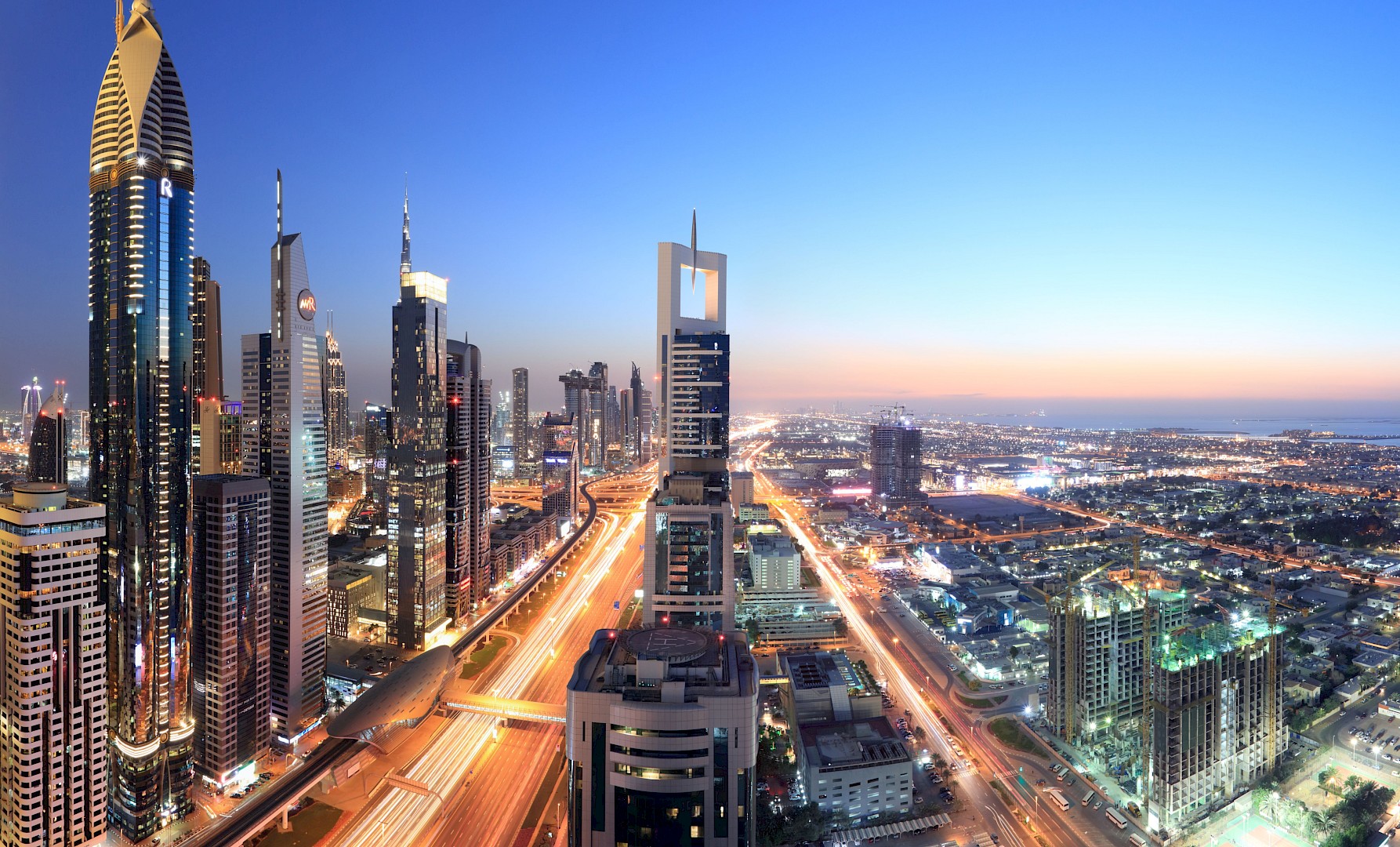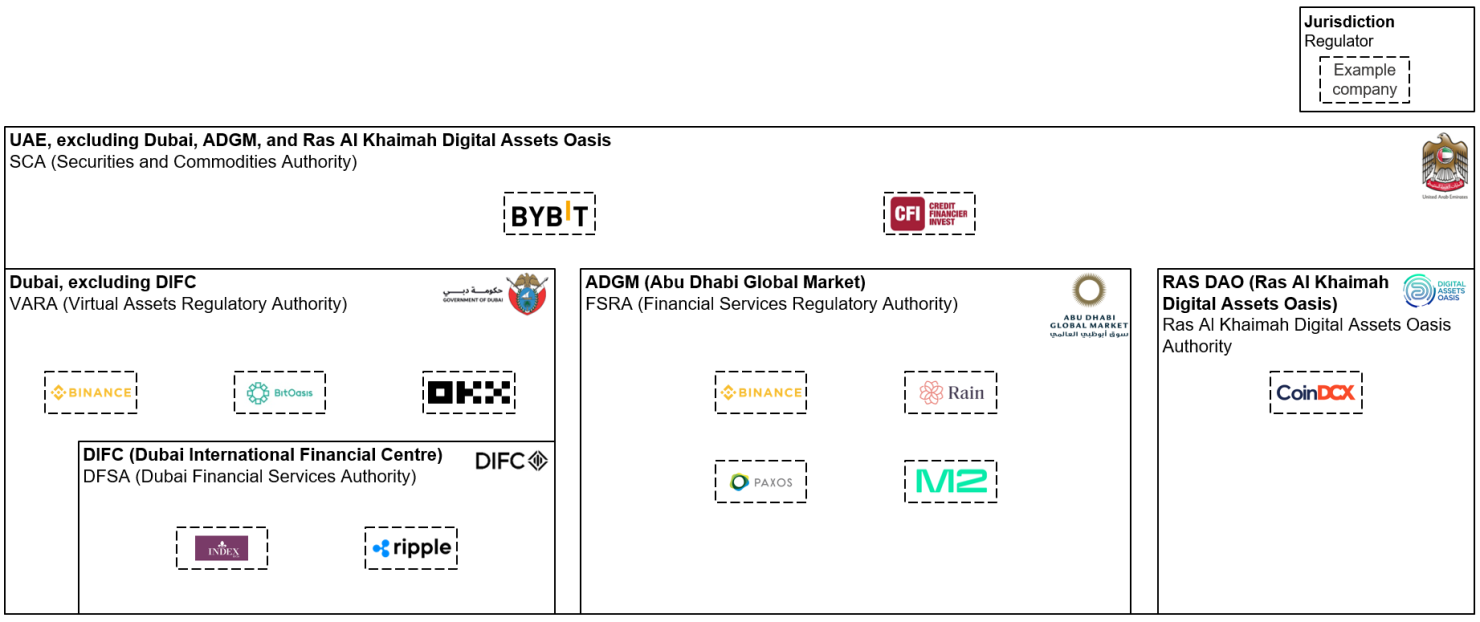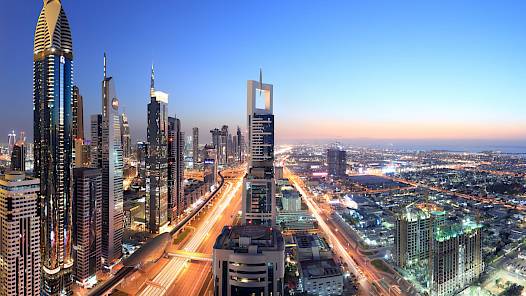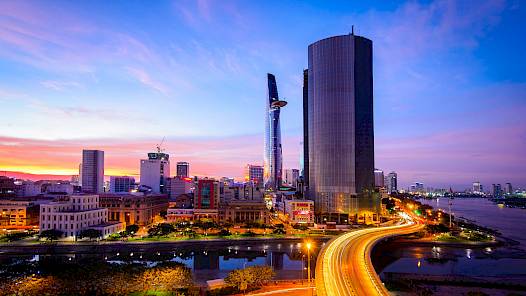UAE's cryptocurrency agenda: Guide to trends, jurisdictions, and challenges
28 October 2025 — The UAE is positioning itself as a key player in cryptocurrency market to diversify its economy. This article explores the country's aim to support cryptocurrency businesses, built on its progressive regulatory support, especially in two main financial hubs of ADGM and DIFC.

Download this post (PDF)
Guided by its broader vision for economic diversification, the UAE is putting strong focus on finance and technology, creating growing space for discussions around cryptocurrencies and blockchain. In the UAE, more people and businesses are showing interest in this asset class. Supportive regulation and market demand have turned it into a topic worth exploring. In this article, we start by examining the opportunities within the UAE’s crypto ecosystem, then look at the main jurisdictions shaping their regulatory landscape and conclude with the key challenges and considerations along the way.
UAE crypto opportunity
UAE’s rise in the digital asset economy as a hub for the emerging markets
Backed by an economy that has nearly tripled in size over the past two decades, with GDP growing from 180 BUSD in 2005 to 537 BUSD in 2024[1], the UAE has been targeting diversification into non-oil sectors. In the first quarter of 2025, the contribution of the non-oil activities to GDP reached over 77 percent, which marks a record in UAE history[2]. While the country's 7 emirates have built a strong reputation in areas like trade, tourism, financial services, and real estate, they currently witness an expanding focus toward the fast-growing digital economy, especially after launching the country's digital economy strategy in 2022 aiming to double the contribution of the digital economy to the UAE's gross domestic product within 10 years[3]. As part of that strategy, notable emphasis has been placed on blockchain[3], with related fields like cryptocurrencies beginning to see growing interest as a result.
The UAE’s ambition in cryptocurrency space is shaped by a mix of legacy and modern pillars. Its reputation for openness to business[4] and tax friendliness[5] makes it one of the most attractive jurisdictions for investors across diverse asset classes, including cryptocurrencies. These ambitions are reinforced by the UAE’s strong bilateral ties with both developed and developing nations. Supportive regulatory and business environments have enabled it to emerge as a key regional hub for cryptocurrencies, and an increasingly influential player among emerging markets. In 2018, UAE’s Abu Dhabi Global Market (ADGM) was one of the first jurisdictions in the world to introduce and implement a comprehensive and transparent regulatory framework for virtual asset activities[6]. Henley Crypto Adoption Index in 2024 named UAE as a leading jurisdiction for crypto investors, ranking third in adoption rate with only Singapore and Hong Kong ahead of it[7]. More than 30% of its residents, roughly three million people, have invested in cryptocurrencies[8], [9].
Capitalizing on crypto growth drivers focusing on standout applications
As a key driver of the UAE’s cryptocurrency landscape, government-led initiatives and applications tied to nation’s digital strategy present promising opportunities for businesses. One area where this becomes relevant is custodial services for digital assets. As crypto market evolves, governments as well as private investors face increasing challenges to ensure compliance and safeguarding assets. Solutions that bridge regulatory requirements with practical adoption, such as secure storage and insurance-backed custodial services, could attract interest from investors. Trading platforms are another area to consider. While competition is intense, platforms that prioritize security and trust may find ways to differentiate themselves. Payment solutions also show signs of traction, with players like and Palazzo Versace Dubai accepting payment in cryptocurrencies, indicating early market adoption and leaving room for further innovation[10], [11]. Overall, the UAE’s focus on developing its crypto ecosystem highlights areas where innovative services and investment vehicles could gain attention. While the landscape is competitive and outcomes uncertain, these sectors illustrate where practical challenges and emerging opportunities overlap, making them worth observing.
When it comes to the market key players, venture capital firms like +VC and SC Ventures are backing fintech startups in areas like digital banking, tokenization, and compliance[12], [13]. Hedge funds such as Nine Blocks focus on market-neutral and systematic strategies[14]. Beyond investments, crypto exchanges play a central role in market activity. Binance has recently deepened its ties with Abu Dhabi by Abu Dhabi-backed investment group MGX making a 2 BUSD investment in Binance which by itself has set camp in the emirate couple of years ago[15], while companies like Coinbase and OKX are expanding their footprint[16], [17]. As trading volumes rise, secure custody solutions have also gained traction, with institutional-focused firms like Zodia Custody, backed by Standard Chartered, meeting this demand[18]. Additionally, a strong blockchain infrastructure supports the ecosystem’s growth. Platforms like MidChains and global tech firm R3 are developing new applications for digital assets[19], [20]. These companies are shaping the backbone of UAE’s digital asset landscape. Tying everything together, jurisdictions and hubs like DIFC and ADGM are formulating the legal framework. DIFC innovation hub offering different support schemes, including a program in partnership with Ripple to accelerate digital assets innovation, and ADGM Hub71 offering a dedicated program to promote Web3 startup growth[21], [22], [23].
The right jurisdiction to maximize benefit realization
Several jurisdictions within one country
Considering the market potential, selecting the right jurisdiction is important, and that is even more important in the UAE where jurisdictions vary, and regulations continuously evolve. Broadly speaking, the UAE cryptocurrency environment is governed by SCA (Securities and Commodities Authority) though key exceptions exist. Notably, some of the most attractive options are among these exceptions and many companies chose to obtain their licenses from one of those highlighted below:
- Dubai is primarily regulated by VARA (Virtual Assets Regulatory Authority), except in DIFC (Dubai International Financial Centre) which is governed independently by DFSA (Dubai Financial Services Authority), while VARA is dedicated to virtual assets regulation, DFSA serves as the overall regulator of DIFC, including cryptocurrencies[24]
- ADGM (Abu Dhabi Global Market), located in Abu Dhabi (the capital of the UAE) has its own independent regulator named FSRA (Financial Services Regulatory Authority) which regulates all financial activities, including cryptocurrency
- Ras Al Khaimah Digital Assets Oasis is an emerging jurisdiction that is dedicated to virtual assets, and is regulated by Ras Al Khaimah Digital Assets Oasis Authority

Companies outside DIFC and ADGM are mostly following the regulations of SCA or VARA (depending on their location) as RAK DAO is in the early years of development. While based on the regulations published in 2022 onwards, the relationship between SCA and VARA was established to some extent. It is worth mentioning that among all economic zones operating under VARA and SCA, DWTC (Dubai World Trade Centre) has been historically a pioneer in cryptocurrency. This, however, does not imply the existence of additional cryptocurrency jurisdictions beyond those already mentioned. A similar approach is applied in the DMCC for blockchain-related activities. DMCC (The Dubai Multi Commodities Centre) issues licenses related to proprietary crypto mining and distributed ledger technology services. Depending on their go-to-market strategy, companies may choose to operate from various locations. For example, SMEs seeking blue oceans may prefer one jurisdiction while some large asset managers and hedge funds may favor another with the presence of family offices and wealth funds. Many companies looking for the right jurisdiction chose to go for ADGM or DIFC because these two jurisdictions have independent regulators practicing common law and offering progressive frameworks for activity[25], [26].
ADGM and DIFC – a closer look at two hubs positioned to serve businesses
ADGM started regulating virtual assets early in 2017 by publishing guidance on initial coin/token offerings (ICOs) and virtual currencies[27]. The first key regulatory framework came out a year after, named "Guidance on Regulation of Virtual Asset Activities in ADGM"[28], [29]. This guidance allows four groups of digital assets to operate within ADGM: virtual assets, digital securities, Fiat tokens, and derivates/funds. Throughout the year, other regulations have been published to form the framework of digital assets or related activities, including " Guidance on Regulation of Digital Security Offerings and Virtual Assets under the Financial Services and Markets Regulations"[30] and "Distributed Ledger Technology Foundations Regulations"[31]. Being a global pioneer in regulating digital assets combined with a recent surge in attraction of financial players from all around the world has enabled ADGM to become one of the most attractive locations globally for institutional investors and asset/fund managers seeking crypto market opportunities. Currently over 300 financial institutions, including over 150 assets and fund managers are active in ADGM[32]. Abu Dhabi, backed by several sovereign wealth funds with a total AUM of around 1.7TUSD[33], has ambitious plans to diversify the economy through strong collaboration with leading financial players. This vision is being realized by creating an ecosystem in collaboration with key players such as investors, crypto intermediaries and exchanges, and blockchain network participants.
DIFC started regulating crypto assets in 2021 by introducing an investment token regime which was later further followed in 2022 by putting the crypto token regime into force and amending the markets law of 2012[34], [35], [36], [37]. Another key milestone was the introduction of digital assets law in which for the first time, legal characteristics of digital assets as a matter of property law was set out in a comprehensive way[38], [39] Under the current DIFC taxonomy, the token ecosystem is divided into three groups: 1) Investment tokens, 2) Crypto tokens, and 3) Excluded tokens[40]. DIFC's two-decades long history of hosting companies in several sectors including financial sector, and introduction of a comprehensive regime has enabled it to build a virtual asset ecosystem from different companies (including large financial institutions, family companies, SMEs, and startups). Currently 7700 companies are active in this district, including around 290 banking and capital market companies and 440 wealth and asset management companies[41]. The district hosts around 1400 companies in fintech and innovation, making it a leading hub not only for large companies but also for SMEs and startups. This approach is aligned with Dubai's long-standing presence as a regional hub for trade and business, and its ambition to strengthen this position across MEASA (Middle East, Africa, and South Asia).
Challenges and considerations
Despite the UAE’s rapid development toward becoming a leading global hub for cryptocurrencies, those seeking to operate in this space must be aware of potential challenges that could impact their activities.
While the country is known for its regulatory pioneering in the crypto sector, having several jurisdictions and various free zones with their own regimes, scopes, fees, and compliance requirements could pose risks that should be mitigated through a thorough legal and regulatory review process. Firms operating across emirates or offering services across jurisdictions, and companies active in multiple parts of the cryptocurrency ecosystem should ensure that they are aware of both short-term and long-term consequences of their market-entry decisions, that also require keeping up with the latest regulatory developments. While local regulations matter, cryptocurrency compliance is also shaped by global developments. Rapid market growth and frequent changes in international standards mean that practices considered compliant today could be questioned in the future. Meanwhile, geopolitical tensions, sanctions, and cross-border legal uncertainties may impact market access, banking relationships, and cross-border services.
Although the UAE was removed from the FATF grey list in 2024[42], this followed years of scrutiny over gaps in anti-money laundering (AML) and counter-terror financing (CFT) controls. The growth in cryptocurrencies due to the nature of these assets could bring risks related to financial crimes. Hence, firms seeking to enter the market must build robust KYC, transaction monitoring, reporting, and governance systems as regulatory enforcement and fines can be severe. Also, the country's progress in enhancing financial transparency and integrity[43] could result in a partial slow-down in the cryptocurrency growth due to compliance requirements.
Finally, while cryptocurrency adoption and transaction volumes are growing rapidly in the UAE, the investor base, both retail and institutional, remains relatively underdeveloped compared to more established asset classes. Price volatility of many digital assets, lack of deep or diversified liquidity pools, and limited availability of hedging and derivative instruments can expose the customers to significant risk. While the UAE presents opportunities, firms unfamiliar with digital assets should be mindful of the unique behaviors, risks, and operational requirements that come with this asset class.
References:
[1] World Bank (2025) retrieved at https://data.worldbank.org/indicator/NY.GDP.MKTP.CD?locations=AE on 28 October 2025
[2] UAE Ministry of Economy (2025) retrieved at https://www.moet.gov.ae/en/-/uae-economy-records-5.3-growth-in-non-oil-activities on 28 October 2025
[3] UAE Government (2025) retrieved at https://u.ae/en/about-the-uae/economy/digital-economy on 28 October 2025
[4] UAE Government (2025) retrieved at https://u.ae/en/about-the-uae/uae-competitiveness/imd-world-competitiveness-yearbook on 28 October 2025
[5] UAE Ministry of Economy (2025) retrieved at https://www.moet.gov.ae/en/-/no-income-tax-and-full-profit-transfer on 28 October 2025
[6] PwC (2025) retrieved at https://www.pwc.com/gx/en/industries/financial-services/assets/navigating-the-global-crypto-landscape-with-PwC-2024.pdf on 28 October 2025
[7] Henley & Partners (2025) retrieved at https://www.henleyglobal.com/publications/henley-crypto-adoption-index on 28 October 2025
[8] Visual Capitalist (2025) retrieved at https://www.visualcapitalist.com/countries-with-the-highest-rates-of-crypto-ownership/ on 28 October 2025
[9] Coincrowd (2025) retrieved at https://coincrowd.com/blogs/why-is-dubai-the-best-city-for-crypto-enthusiasts#:~:text=Source%3A%20YouGov.,within%20the%20next%20five%20years on 28 October 2025
[10] Blockworks (2025) retrieved at https://blockworks.co/news/emirates-airline-to-accept-bitcoin-payments-and-launch-nft-collection on 28 October 2025
[11] Hotel & Catering News Middle East (2025) retrieved at https://hotelandcatering.com/hotel-catering-me/palazzo-versace-dubai-taps-binance-to-accept-crypto-payments on 28 October 2025
[12] Plus.VC (2025) retrieved at https://plus.vc/investments-portfolio on 28 October 2025
[13] Fintech Magazine (2025) retrieved at https://fintechmagazine.com/articles/sc-ventures-sbi-holdings-start-uae-joint-investment-venture on 28 October 2025
[14] Nine Blocks Capital (2025) retrieved at https://www.nineblockscapital.com/ on 28 October 2025
[15] Reuters (2025) retrieved at https://www.reuters.com/technology/binance-says-abu-dhabis-mgx-invests-2-bln-into-crypto-exchange-2025-03-12/ on 28 October 2025
[16] Coinbase (2025) retrieved at https://www.coinbase.com/th/blog/the-uae-recognising-the-transformative-potential-of-the-cryptoeconomy on 28 October 2025
[17] OKX (2025) retrieved at https://www.okx.com/en-eu/learn/to-another-year-of-building on 28 October 2025
[18] Zodia Custody (2025) retrieved at https://zodia-custody.com/emirates-nbd-powers-digital-asset-custody-in-the-uae-through-investment-in-zodia-custody/ on 28 October 2025
[19] WAM (2025) retrieved at https://www.wam.ae/en/details/1395302974280 on 28 October 2025
[20] Fintech Finance News (2025) retrieved at https://ffnews.com/newsarticle/cryptocurrency/emirates-nbd-welcomes-r3-to-digital-asset-lab-council/ on 28 October 2025
[21] DIFC (2025) retrieved at https://www.difc.com/whats-on/news/ripple-announces-partnership-with-difc-innovation-hub-to-accelerate-adoption-of-blockchain on 28 October 2025
[22] Hub71 (2025) retrieved at https://www.hub71.com/program/hub71-plus-digital-assets on 28 October 2025
[23] ADGM (2025) retrieved at https://www.adgm.com/media/announcements/abu-dhabi-launches-hub71-plus-digital-assets-to-accelerate-growth-of-web3-startups on 28 October 2025
[24] VARA (2025) retrieved at https://www.vara.ae/en/about-vara/ on 28 October 2025
[25] ADGM (2025) retrieved at https://www.adgm.com/about on 28 October 2025
[26] DIFC (2025) retrieved at https://www.difc.ae/business/laws-and-regulations on 28 October 2025
[27] IOSCO (2025) retrieved at https://www.iosco.org/library/ico-statements/Abu%20Dhabi%20-%20FSRA%20-%20Guidance%20-%20ICOs%20and%20Virtual%20Currencies.pdf on 28 October 2025
[28] ADGM (2025) retrieved at https://www.adgm.com/media/announcements/adgm-launches-crypto-asset-regulatory-framework on 28 October 2025
[29] ADGM (2025) retrieved at https://en.adgm.thomsonreuters.com/rulebook/guidance-regulation-virtual-asset-activities-adgm-2-january-2025 on 28 October 2025
[30] ADGM (2025) retrieved at https://en.adgm.thomsonreuters.com/rulebook/guidance-regulation-digital-security-offerings-and-virtual-assets-under-financial-services on 28 October 2025
[31] ADGM (2025) retrieved at https://en.adgm.thomsonreuters.com/sites/default/files/net_file_store/ADGM1547_26199_VER94959.pdf on 28 October 2025
[32] ADGM (2025) retrieved at https://www.adgm.com/media/announcements/adgm-is-the-mena-region-largest-ifc-with-11128-active-licences-at-the-end-of-h1-2025 on 28 October 2025
[33] Global SWF (2025) retrieved at https://globalswf.com/news/abu-dhabi-named-world-s-wealthiest-city-with-us-1-7-trillion on 28 October 2025
[34] DFSA (2025) retrieved at https://www.dfsa.ae/news/dfsas-crypto-regime-one-year on 28 October 2025
[35] DFSA (2025) retrieved at https://dfsaen.thomsonreuters.com/rulebook/1-november-2022-dfsa-crypto-token-regime-comes-force on 28 October 2025
[36] DFSA (2025) retrieved at https://dfsaen.thomsonreuters.com/node/25531/revisions/46501/view on 28 October 2025
[37] DFSA (2025) retrieved at https://dfsaen.thomsonreuters.com/sites/default/files/net_file_store/Amendment_to_DIFC_Laws_-_DIFC_Amendment_Law_No._4_of_2022.pdf on 28 October 2025
[38] DIFC (2025) retrieved at https://edge.sitecorecloud.io/dubaiintern0078-difcexperie96c5-production-3253/media/project/difcexperiences/difc/difcwebsite/documents/laws--regulations/digital_assets_law_2_of_2024.pdf on 28 October 2025
[39] DIFC (2025) retrieved at https://www.difc.ae/whats-on/news/difc-announces-enactment-of-new-digital-assets-law---new-law-of-security-and-related-amendments on 28 October 2025
[40] DFSA (2025) retrieved at https://www.dfsa.ae/innovation#fintech_sublink_5 on 28 October 2025
[41] DIFC (2025) retrieved at https://www.difc.com/whats-on/news/difc-records-best-ever-performance-for-the-first-half-of-a-year on 28 October 2025
[42] Reuters (2025) retrieved at https://www.reuters.com/world/africa/fatf-financial-crime-watchdog-removes-uae-gibraltar-grey-list-2024-02-23 on 28 October 2025
[43] Emirates Policy Center (2025) retrieved at https://www.epc.ae/en/details/brief/the-uae-is-a-global-hub-for-cryptocurrency-benefits-and-challenges on 28 October 2025
Tags
UAE, Middle East, Virtual asset, Cryptocurrency, Dubai, Abu Dhabi, DIFC, ADGM










